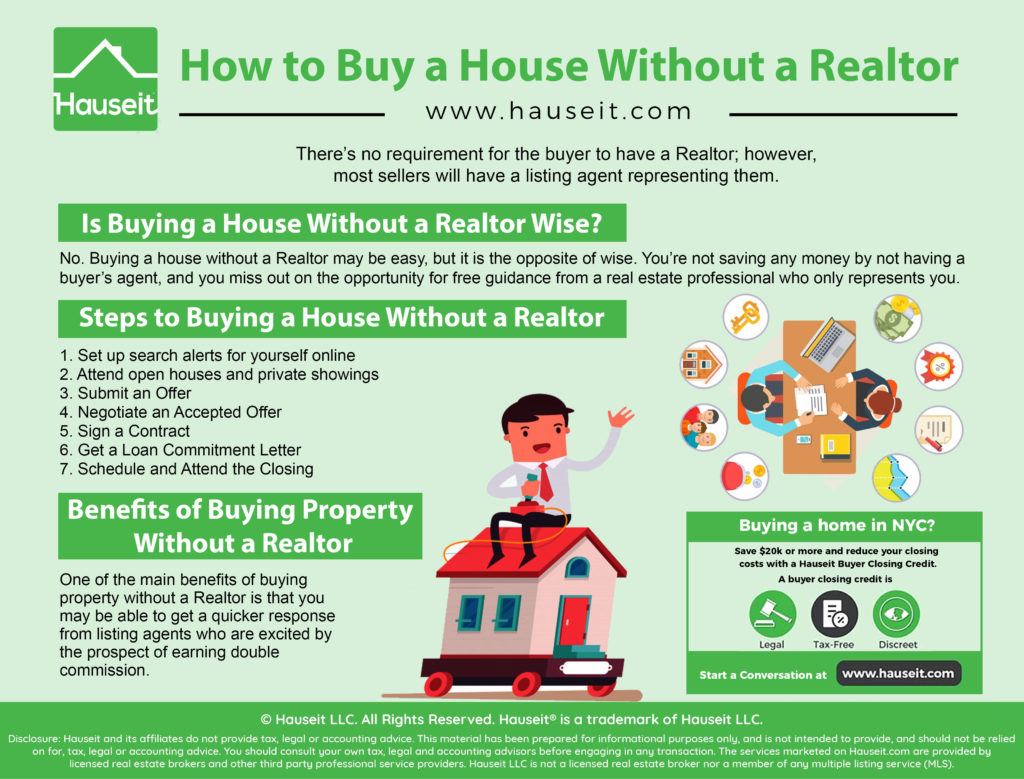Buying a house without a Realtor is easy. There’s no requirement for the buyer to have a Realtor; however, most sellers will have a listing agent representing them. Many MLS broker databases allow members of the public to search for listings directly on their websites, or you could search on your own on any number of popular, public property search websites.
Table of Contents:

No. Buying a house without a Realtor may be easy, but it is the opposite of wise. You’re not saving any money by not having a buyer’s broker, and you miss out on the opportunity for free guidance from a real estate professional who only represents you.
Many first time home buyers will dismiss the idea of having a buyer’s agent because they feel like they don’t need any help. After all, they can easily find virtually any listing online, so why do they need an agent to represent them? Wouldn’t this agent just be another middleman that gets in the way?
This couldn’t be further from the truth.
A great buyer’s agent will scour the web and the MLS for both private and public listings that specifically meet your needs.
You might get access to pocket listings that are only seen by brokers.
Most importantly, your buyer’s agent will guide you through the home buyer process, from submitting an offer to closing. A buyer’s agent will also be a great resource for you should you need any referrals to other real estate professionals such as lawyers, home inspectors, contractors, designers etc.
Most importantly, having a buyer’s agent doesn’t cost you a dime. The seller typically agrees to pay a fixed commission rate, say 6% on average, regardless of whether the buyer has an agent or not. If the buyer chooses to waive their right to free, buy side representation, then the listing agent simply collects both sides of the commission.
However, most buyers are smart enough to realize that it’s use it or lose it when it comes to having a free buyer’s agent. As a result, 90% of deals are done today between a seller’s agent and a buyer’s agent.
When the buyer has an agent, the commission is automatically split, typically equally per MLS association rules, between the buyer’s agent and the seller’s agent.
The key takeaway from this section is that even though learning how to buy a house without a Realtor may be easy, it may not be wise.
Don’t think that you’re being clever by avoiding a buyer’s agent. There’s a reason why the vast majority of buyers end up having their own representation. After all, who would turn down the opportunity for a free real estate concierge?
Our Discretion, Your Advantage
Our traditional partner brokers never openly discount which means less disruption and better execution for you.
1. Set up search alerts for yourself online
You’ll need to search for listings on your own, which means setting up search alerts on a real estate search website so you’ll get an email notification whenever a new listing comes on the market that matches your search criteria.
It doesn’t matter which property search site you use as long as you like their interface and search functionality. That’s because property websites generally pull the exact same data from local MLS broker databases. If you live in a metropolitan area like NYC, consider using a locally focused website like the New York Times or StreetEasy to search for properties. If you live in a more suburban or rural area, consider using a website like Realtor.com or Zillow which covers the entire country.
2. Attend open houses and private showings
You should attend as many open houses as possible in order to get a sense of what you like and don’t like, and to get a feel for the market and what properties are worth.
Open houses are easier to attend because they are low commitment, and you won’t feel bad if you have to cancel or are running late. In fact, you don’t need to make an appointment at all.
You can simply walk in at any point of the open house which typically lasts anywhere from one to three hours.
Furthermore, you aren’t required to have an agent to attend an open house. This is important for some suburban areas where digital lockboxes are used.
For example, lockboxes in the Hudson Valley are accessible by an app used exclusively by HGAR members. Sure, it may be possible to get a one-time showing code if you’re not a HGAR member, but it introduces additional hassle and scheduling.
Furthermore, many listing brokers will not be comfortable in giving out one time showing codes to unlicensed members of the public. As a result, it still may be possible to schedule a direct showing, but the listing broker would have to show up and personally show it to you.
It’s much easier to learn how to buy a house without a Realtor in densely populated urban centers like NYC where lockboxes are not used.
In NYC, listing brokers will usually be present at every showing unless the apartment is vacant and the keys can be left with the doorman. Even then, listing brokers will generally show up if the buyer is unrepresented for two reasons.
One, because the listing broker wants to build rapport with a potential buyer client, and two because of security reasons. The last thing a listing broker wants is for their client’s property to be ransacked or squatted on.
3. Submit an Offer
Submit an offer directly to the listing agent if you wish to forgo buyer representation. In the rare situation where the house is being sold directly by the owner, you can submit your offer directly to the owner.
Make sure you include a mortgage pre-approval letter if you will be financing your purchase, or proof of funds if you will be purchasing all cash or putting more than 50% down. Some local real estate associations like NYC’s Real Estate Board of New York will require buyers to also submit a personal financial statement (i.e. REBNY Financial Statement).
You can submit all of this by email, along with your proposed offer price, how much you plan on putting down, preferred closing date, and any home buying contingencies. You can also specify any inclusions or exclusions such as chandeliers or window blinds that you or the owner want to keep or remove. It’s also a good idea to include a home buyer offer letter or at least a short biography about yourself. Lastly, please include your real estate attorney’s contact information if you live in a state like New York where lawyers are required for purchase contracts.
4. Negotiate an Accepted Offer
The seller may reject, counter, accept or ignore your offer. As a result, it’s a good idea to place offers on multiple properties to give yourself optionality. Keep in mind that offers are generally not binding until contracts have been signed.
For example, in New York, it’s widely known that real estate offers are not binding at all, whether they were accepted in writing or verbally. However, please consult your attorney if you live in a state outside of New York just to be safe. Remember, anyone can sue you for anything regardless of what is commonly accepted.
Once you’ve gotten your offer accepted, it’s time to have your lawyer conduct legal and financial due diligence while you order a home inspection. While home inspections are not typically done for co-ops or condos, home inspections are quite normal when buying free-standing property such as a single family house.
Your lawyer will order a title search and review the title report for any liens, judgments or violations. Your lawyer will also negotiate the purchase contract on your behalf and review it for you. If you’re buying a condo or co-op apartment, your lawyer will review the building’s annual financial statements, the building’s budget, original co-op or condo offering plan, any amendments to the offering plan and the co-op or condo board meeting minutes.
5. Sign a Contract
You can negotiate after inspection or if anything else comes up during the due diligence period. Deals generally only become binding after the contract has been reviewed and finalized to everyone’s satisfaction, and both the buyer and the seller have signed the contract. A listing is said to be “in contract” after both sides have mutually executed a contract of sale.
6. Get a Loan Commitment Letter
Once you have a fully executed contract, it’s time to finalize your financing if you will be utilizing a mortgage. Work with your mortgage broker or bank to finish the mortgage underwriting process. Once your loan has been conditionally approved, you’ll receive a mortgage commitment letter from the bank. This is the closest thing you’ll get to a promise from a lender that they’ll actually show up on closing day with the money.
7. Schedule and Attend the Closing
Your lawyer can help you schedule a closing date, time and place. On closing day, your lawyer will guide you through the various forms and documents that you’ll be required to sign. Your lawyer will also give you a closing statement beforehand which will explain the exact flow of funds. Your lawyer will of course review all of the checks at closing to make sure the flow of funds is correct.
You can expect to see attorneys representing both the buyer and the seller at closing, along with an attorney representing the bank if you are getting a mortgage. You’ll also see a representative from the title company who often acts as a closing coordinator. Lastly, you may see the seller’s broker present. You won’t see your broker present however if you’ve chosen not to have one.
Please keep in mind that even if you do have a broker, they often don’t show up to closings because there isn’t a role for them on closing day. Often times, there aren’t even enough chairs for the brokers! As a result, brokers often pick up their commission checks at another more convenient time.
Save 2% On Your Home Purchase
Save thousands on your home purchase with a buyer agent commission rebate from Hauseit
One of the main benefits of buying property without a Realtor is that you may be able to get a quicker response from listing agents who are excited by the prospect of earning double commission under what’s known as dual agency.
However, many savvy buyers use this to their advantage by seeing a property first directly with the listing agent, and only then looping in their buyer’s agent if they have any interest in making an offer.
Be warned however, you may lose much more than time if your buyer’s agent is incompetent. If so, it’s much worse to have an agent than to not have one, especially if your buyer’s agent is unresponsive or too busy for your deal.
Having an unresponsive agent on the buy side is one of the worst things, as it can cause delays in scheduling and even offer negotiation, if you manage to get that far.
Fortunately, this latter problem can be easily avoided given the abundance of qualified real estate agents out there. For example, there are 50,000 licensed real estate agents in the NYC metro area alone. All you have to do is to find a real estate agent that’s trustworthy, competent, knowledgeable and responsive.
Disclosure: Hauseit® and its affiliates do not provide tax, legal, financial or accounting advice. This material has been prepared for informational purposes only, and is not intended to provide, and should not be relied on for, tax, legal, financial or accounting advice. No representation, guarantee or warranty of any kind is made regarding the completeness or accuracy of information provided.






